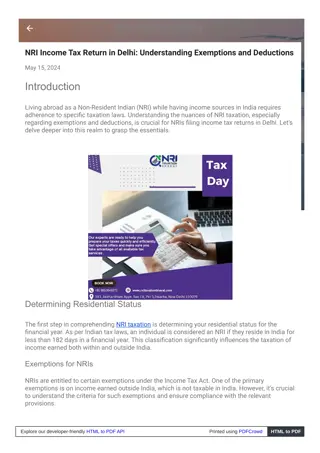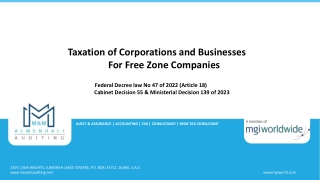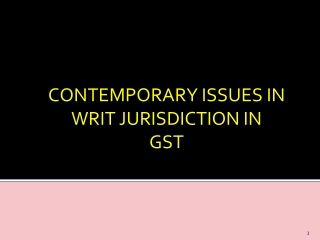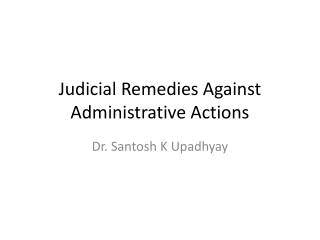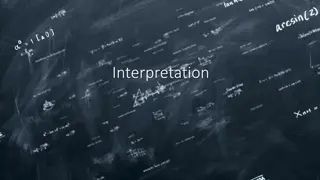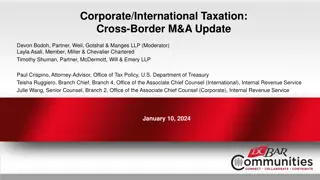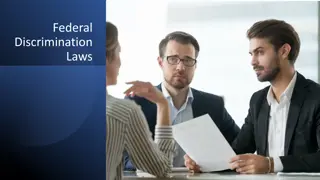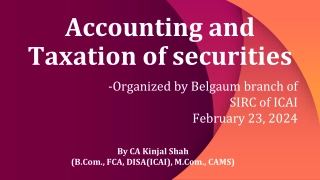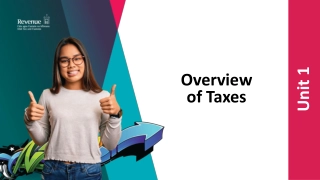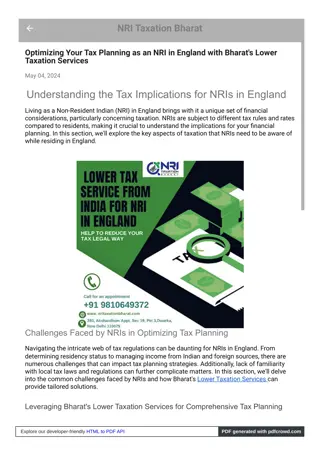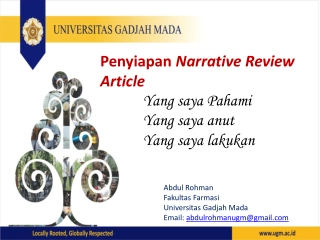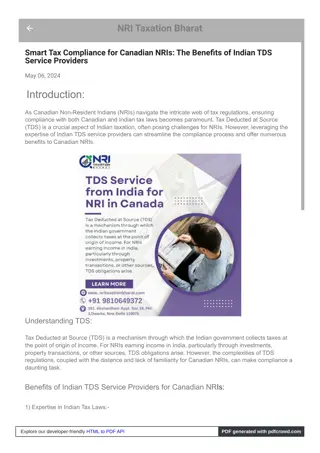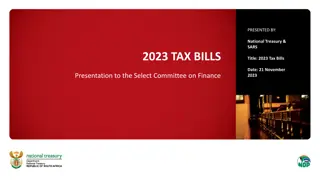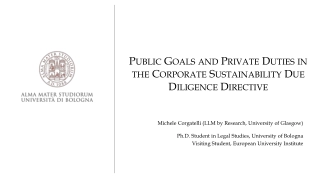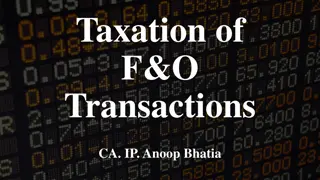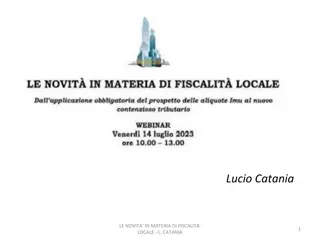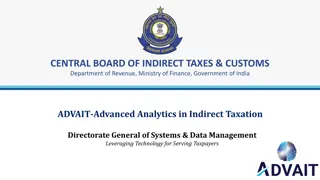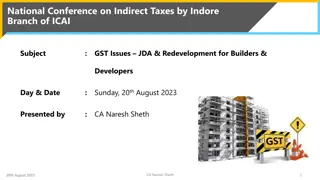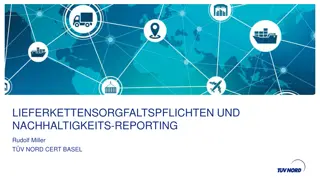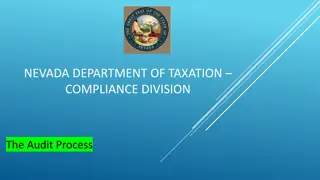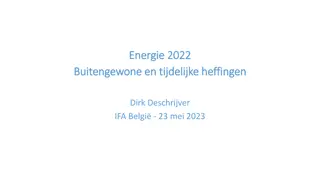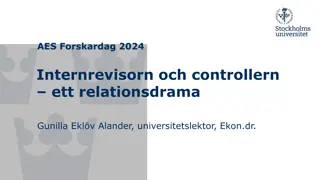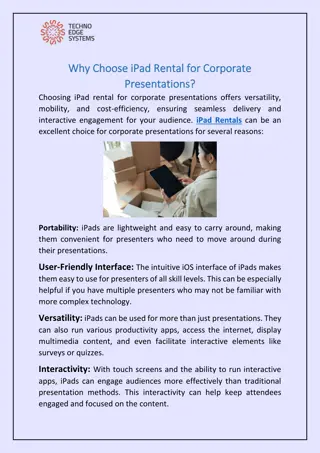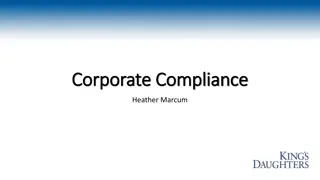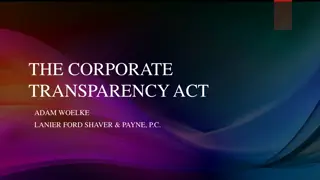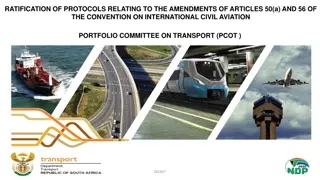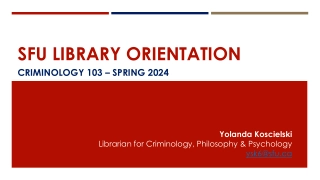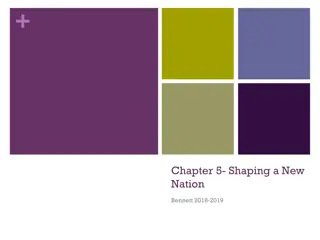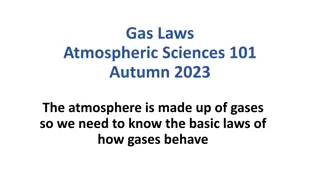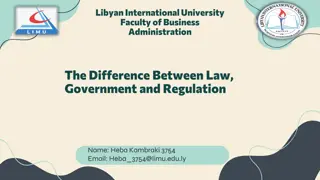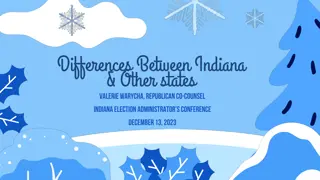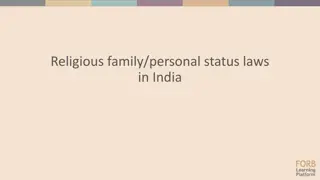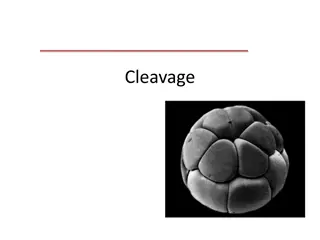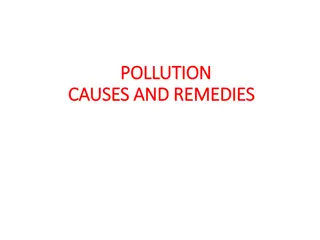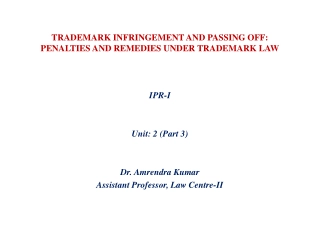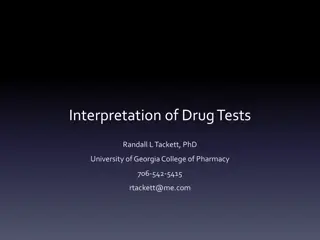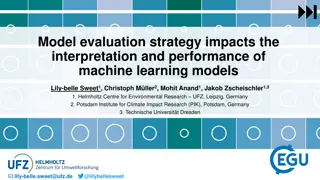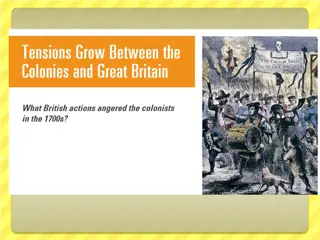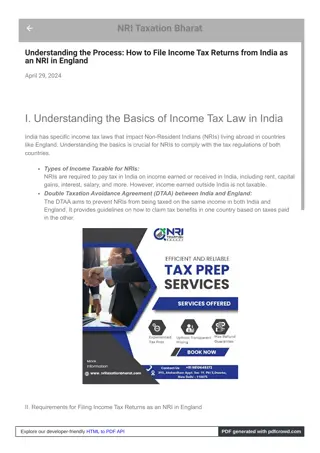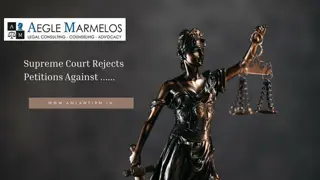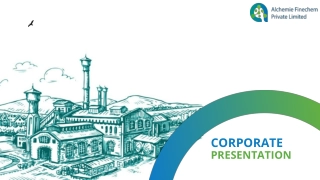Interpretation of Statutes and Articles: Taxation, Corporate Laws, Writ Remedies
Understanding the interpretation of statutes, articles of the Indian Constitution in relation to taxation, corporate laws for practicing members, and utilizing writ remedies before the High Court and Supreme Court. Exploring the scope of writs for enforcing fundamental rights, constitutional rights, statutory rights, and more against public duty entities. Fundamental rights, writ jurisdiction, and implications elucidated.
Interpretation of Statutes and Articles: Taxation, Corporate Laws, Writ Remedies
PowerPoint presentation about 'Interpretation of Statutes and Articles: Taxation, Corporate Laws, Writ Remedies'. This presentation describes the topic on Understanding the interpretation of statutes, articles of the Indian Constitution in relation to taxation, corporate laws for practicing members, and utilizing writ remedies before the High Court and Supreme Court. Exploring the scope of writs for enforcing fundamental rights, constitutional rights, statutory rights, and more against public duty entities. Fundamental rights, writ jurisdiction, and implications elucidated.. Download this presentation absolutely free.
Presentation Transcript
INTERPRETATION OF STATUTES, ARTICLES OF THE CONSTITUTION OF INDIA WITH RESPECT TO THE TAXATION, CORPORATE & OTHER LAWS RELEVANT FOR MEMBERS IN PRACTICE AND WRIT REMEDIES BEFORE HIGH COURT AND SUPREME COURT 1
Writ before High Court or Supreme Court is a public law remedy i.e. it gives right to any person to approach High Court or Supreme Court for the enforcement of his right against any person or authority performing public duty. Rights which comes for enforcement:- (a) fundamental rights given by the Constitution; (b) constitutional rights not having the status of fundamental rights; (c) statutory rights; (d) rights flowing from subordinate legislation; (e) rights based on case law; (f) customary rights; (g) contractual rights. Writ can be filed to enforce rights against action as well inaction of any person or authority performing public duty. Where a fundamental right is involved, a party should be free to approach either High Court or Supreme Court under Article 226 or Article 32 of the Constitution of India. The power of the High Court to issue writs under article 226 is wider than that of the Supreme Court. It is not confined to fundamental rights, but extends to all cases where the breach of a right is alleged. The writ may be issued for the enforcement of fundamental rights of for any other purpose. 2
Fundamental rights are in part III of the constitution of India. Article 12 to Article 35 are fundamental rights. Article 14 to 18 relates to Right to equality or prohibition of discrimination. Article 19 relates to rights to freedom of speech, to move freely throughout territory of India, right to reside and settle in any party of India, right to practise any profession, or to carry any trade, occupation or business. Article 20 relates to avoidance of double jeopardy or conviction or penalty on the basis of anterior law or be witness against himself. Article 21 relates to right to life which is a colourless article. It is a repository of various human rights. Where relief through High Court is available under article 226, it is advisable that one should first approach the High Court. The High Court, under article 226, cannot sit as an appellate court on administrative decisions. In general, a disputed question of fact is not investigated in a proceeding under article 226. The High Court may interfere with a finding of fact, if it is shown that the finding is not supported by any evidence, or that the finding is perverse or based upon a view of facts which could never be reasonably entertained. A finding based on no evidence constitutes an error of law, but an error in appreciation of evidence or in drawing inferences is not, except where it is perverse, that is to say, such a conclusion as no person properly instructed in law could have reached, or it is based on evidence which is legally inadmissible. If the conclusion on facts is supported by evidence on record, no interference is called for even though the court considers that another view is possible. 3
The combination of State aid and the furnishing of an important public service may result in a conclusion that the operation should be classified as a State agency. If a given function is of such public importance and so closely related to governmental functions as to be classified as a governmental agency, then even the presence or absence of State financial aid might be irrelevant in making a finding of State action. If the function does not fall within such a description, then mere addition of State money would not influence the conclusion. Article 12 of the Constitution of India gives an inclusive definition to the expression 'State', and says that for purposes of Part III of the Constitution the expression 'State' includes the Parliament of India, the Government and the Legislature of each of the States and Local or other authorities within the territory of India or under the control of the Government of India. In Board of Control for Cricket in India and Ors. vs. Cricket Association of Bihar and Ors. (22.01.2015 - SC) : MANU/SC/0069/2015 it was held that BCCI may not be State Under Article 12 of the Constitution but is certainly amenable to writ jurisdiction Under Article 226 of the Constitution of India. Though the remedy Under Article 32 is not available, an aggrieved party can always seek a remedy under the ordinary course of law or by way of a writ petition Under Article 226 of the Constitution, which is much wider than Article 32. In America, corporations or associations, private in character, but dealing with public rights, have already been held subject to constitutional standards. Institutions engaged in matters of high public interest or performing public functions are by virtue of the nature of the function performed government agencies. Activities which are too fundamental to the society are by definition too important not to be considered government function. This demands the delineation of a theory which requires Government to provide all persons with all fundamentals of life and the determinations of aspects which are fundamental. 4
The State today has an affirmative duty of seeing that all essentials of life are made available to all persons. The task of the State today is to make possible the achievement of a good life both by removing obstacles in the path of such achievements and in assisting individual in realising his ideal of self-perfection. It was pointed out by Douglas, J., in Evans v. Newton that "when private individuals or groups are endowed by the State with powers or functions governmental in nature, they become agencies or instrumentalities of the State". With the growth of the welfare State, it is very difficult to define what functions are governmental and what are not. Institutions engaged in matters of high public interest or performing public functions are by virtue of the nature of the functions performed government agencies. Activities which are too fundamental to the society are by definition too important not to be considered government functions. It may be noted that besides the so called traditional functions, the modern State operates a multitude of public enterprises and discharges a host of other public functions. If the functions of the corporation are of public importance and closely related to governmental functions, it would be a relevant factor in classifying the corporation as an instrumentality or agency of Government. A State may deem it as essential to its economy that it own and operate a railroad, a mill, or an irrigation system as it does to own and operate bridges, street lights, or a sewage disposal plant. What might have been viewed in an earlier day as an improvident or even dangerous extension of State activities may today be deemed indispensable. 5
The powers conferred upon the High Court under article 226 are discretionary in nature which can not be invoked if there is efficacious alternative remedy. The remedy of writ is (a) extraordinary; (b) discretionary (unless a fundamental right is involved); (c) dependent on there being a cause of action; (d) exercisable only against the parties before the court. At the preliminary stage of hearing of a writ petition, the High Court is required to consider whether relief as claimed can be allowed. If prima facie case is made out than, the rule nisi can be issued calling upon the persons against whom relief is sought to show cause as to why such relied should not be granted. Non-entertainment of petitions under writ jurisdiction by the High Court when an efficacious alternative remedy is available is a rule of self-imposed limitation. It is essentially a rule of policy, convenience and discretion rather than a rule of law. Undoubtedly, it is within the discretion of the High Court to grant relief under Article 226 despite the existence of an alternative remedy. The remedy under the statute, however, must be effective and not a mere formality with no substantial relief. 6
There are some exceptions to the Rule of alternative remedy where the statutory authority has not acted in accordance with the provisions of the enactment in question, or in defiance of the fundamental principles of judicial procedure, or has resorted to invoke the provisions which are repealed, or when an order has been passed in total violation of the principles of natural justice or where the order or proceedings are wholly without jurisdiction or the vires of an Act is challenged or where alternate remedy being ineffectual or not efficacious The function of the Court is to see that lawful authority is not abused but not to appropriate to itself the task entrusted to that authority. It is well settled that a public body invested with statutory powers must take care not to exceed or abuse its power. It must act in good faith and it must act reasonably. Courts are not to interfere with economic policy which is the function of experts. It is not the function of the courts to sit in judgment over matters of economic policy and it must necessarily be left to the expert bodies. It is not the domain of the court to embark upon unchartered ocean of public policy in an exercise to consider as to whether a particular public policy is wise or a better public policy can be evolved. Such exercise must be left to the discretion of the executive and legislative authorities as the case may be. Repeated writ petitions not entertainable if earlier petitions seeking same relief either dismissed or withdrawn. 7
While there are different periods of limitation prescribed for the institution of different kinds of suits by the Limitation Act, 1963, there is no such period prescribed by law in respect of petitions filed under Article 226 of the Constitution. Delay and laches is one of the factors that requires to be borne in mind by the High Courts when they exercise their discretionary power under Article 226 of the Constitution of India. In an appropriate case, the High Court may refuse to invoke its extraordinary powers if there is such negligence or omission on the part of the applicant to assert his rights taken in conjunction with the lapse of time and other circumstances. The High Court does not ordinarily permit a belated resort to the extraordinary remedy because it is likely to cause confusion and public inconvenience and bring in its train new injustices, and if writ jurisdiction is exercised after unreasonable delay, it may have the effect of inflicting not only hardship and inconvenience but also injustice on third parties. When writ jurisdiction is invoked, unexplained delay coupled with the creation of third-party rights in the meantime is an important factor which also weighs with the High Court in deciding whether or not to exercise such jurisdiction. this rule of laches or delay is not a rigid rule which can be cast in a straitjacket formula, for there may be cases where despite delay and creation of third-party rights the High Court may still in the exercise of its discretion interfere and grant relief to the petitioner. But, such cases where the demand of justice is so compelling that the High Court would be inclined to interfere in spite of delay or creation of third-party rights would by their very nature be few and far between. The satisfactory way of explaining delay in making an application under Article 226 is for the petitioner to show that he had been seeking relief elsewhere in a manner provided by law. 8
On a combined reading of clauses (1) and (2) of article 226, one can say that writ can be issued against a Government, person or authority if (a) its seat is within the High Court s jurisdiction, or (b) the cause of action has arisen, wholly or in part, within the High Court s jurisdiction. Neither consent nor waiver nor acquiescence can confer jurisdiction upon a court, otherwise incompetent to try the suit. A defect in the jurisdiction goes to the root of the matter which cannot be cured by the consent of the parties. A decree passed by a court without jurisdiction is a coram non judice. Any judgment passed by such court cannot be taken to be valid and could be challenged at any stage of the suit. Where there may be two or more competent courts which can entertain a suit consequent upon a part of the cause of the action having arisen there within, if the parties to the contract agreed to vest jurisdiction in one such to try the dispute which might arise as between themselves, the agreement would be valid. The making of the contract is part of the cause of action. Acceptance of an offer and its intimation result in a contract and hence a suit can be filed in a court within whose jurisdiction the acceptance was communicated. The performance of a contract is part of cause of action. Even if a small part of cause of action arises within the territorial jurisdiction of the High Court, the same by itself may not be considered to be a determinative factor compelling the High Court to decide the matter on merit. In appropriate cases, the Court may refuse to exercise its discretionary jurisdiction by invoking the doctrine of forum conveniens.The forum conveniens is that which is having the jurisdiction convenient to all to decide the case. In international contracts, the parties may contract between themselves to submit their dispute to the jurisdiction of the court which is unrelated to either of the parties and so if in such case the defendant makes an unconditional appearance before such court, it will amount to submission. 9
Certiorari - The decision is against natural justice, mala fide, perverse or without conforming to the principles of fair play . Object of certiorari is to get rid of a decision which is vitiated by a defect or jurisdiction or a denial of the basic principles of justice. (a) Certiorari may be issued where the law under which the decision was given is void; (b) the decision itself violates a fundamental right or (c) the decision violates the law or is without jurisdiction; (a) Defect of jurisdiction attracts certiorari. b) certiorari will issue if, there is an error of law apparent on the face of the record, (as stated above) or if the tribunal acts without sufficient evidence or misdirects itself in considering the evidence. Habeas Corpus - object is to secure the release of a person found to be detained illegally. Mandamus - Mandamus would issue to command a statutory authority to perform its duty to exercise its discretion according to law, but not to exercise its discretion in a particular manner unless that is expressly required by the law. Mandamus will not issue to direct a subordinate Legislative authority to enact or not to enact a rule, order or notification which it is competent to enact Prohibition - A writ of prohibition is normally issued only when the inferior Court or Tribunal (a) proceeds to act without or in excess of jurisdiction, (b) proceeds to act in violation of rules of natural justice, (c) proceeds to act under law which is itself ultra vires or unconstitutional, or (d) proceeds to act in contravention of fundamental rights. Quo Warranto - The object of the writ of Quo Warranto is to prevent a person to hold an office which he is not legally entitled to hold. If the enquiry leads to the finding that the holder of the office has no valid title added to it, the court may pass an order preventing the holder to continue in office and may also declare the office vacant. Quo warranto is used to test a person s legal right to hold an office, not to evaluate the person s performance in the office. Quo warranto is not available to decide whether an official has committed misconduct in office. 10
Public interest litigation is a proceeding in which an individual or group seeks relief in the interest of the general public and not for its own purpose. The spate of such litigation has enriched the law, modified the traditional doctrine of locus standi and led to the devising of new remedies and procedures. In case of public interest litigation, the persons concerned who move such writ application not for enforcing his personal right but filed by public spirited and individual espousing the cause of large number of people who are suffering under some legal wrong or injury and such person or determinated class of persons is by reason of poverty, helplessness or disability or socially or economically disadvantaged position, unable to approach the court for relief and in such case any member of the public can maintain writ application. The grievance in a public interest action, generally speaking, is about the content and conduct of Government action in relation to the Constitutional or statutory rights of segments of society and, in certain circumstances the conduct of Government policies. The concept of Public Interest Litigation (PIL) is in consonance with the principles enshrined in Article 39A of the Constitution of India to protect and deliver prompt social justice with the help of law. In Kalyaneshwari vs Union of India, the court cited the misuse of public-interest litigation in business conflicts. A writ petition was filed in the Gujarat High Court seeking the closure of asbestos units, stating that the material was harmful to humans. The high court dismissed the petition, stating that it was filed at the behest of rival industrial groups who wanted to promote their products as asbestos substitutes. A similar petition was then submitted to the Supreme Court. The plea was dismissed, and the plaintiff was assessed a fine of 100,000. 11
High Court justified in entertaining writ petition against show cause notice, notwithstanding availability of alternate remedy, when no disputed question of fact was involved and only legal issue was to be decided on the basis of facts admitted by both parties - Article 226 of Constitution of India. Deputy Commissioner v. Sushil & Company 2016 (42) S.T.R. 625 (S.C.). Prejudice by denial of cross-examination of witnesses - Procedural infirmity brought to notice of Constitutional Court cannot wait rectification till finding of prejudice in final order which would require to be set aside, making entire proceedings nullity - Deponents may not be available after long delays in litigation - Accused has right to defend himself reasonably at earliest opportunity, and that would not prejudice department or stall their inquiry - It is abuse to allow alleged delinquent be absolved of consequences merely for procedural error - Mohammed Fariz & Company v. Commissioner 2019 (369) E.L.T. 218 (Ker.). When the order passed by the Tribunal has not been stayed or set aside by the Hon ble Supreme Court, it is the bounden duty of the adjudicating authority to follow the law laid down by the Tribunal. Since a binding decision has not been followed by the adjudicating authority in this case, this Court can interfere straightaway without relegating the assessee to file an appeal. INDUSTRIAL MINERAL CO. (IMC) Versus COMMISSIONER OF CUS., TUTICORIN - 2018 (15) G.S.T.L. 249 (Mad.). Hon ble Supreme Court reported in 1983 (13) E.L.T. 1342 (S.C.) (East India Commercial Co. Ltd., Calcutta v. Collector of Customs, Calcutta). The Hon ble Supreme Court held that the law declared by the highest Court in the State is binding on authorities or tribunals under its superintendence and that they cannot ignore it either in initiating a proceeding or deciding on the rights involved in such a proceeding. If that be so, the proceedings of the authority themselves would be invalid and without jurisdiction. If the proceedings are without jurisdiction, the question of applying the rule with regard to the exhaustion of alternative remedy can be dispensed with. 12
RIDDHI SIDDHI COLLECTION Versus UNION OF INDIA - 2019 (368) E.L.T. 852 (Bom.) - The objective of giving show cause notice is not an empty formality. The objective is to make the party aware of the case it has to meet. Thus time is given to respond to the same. The reduction of time as given in the notice, certainly causes prejudice to the party. The conduct of the petitioner in not attending the personal hearing would not absolve the Revenue from giving time of thirty days as stated in the notice, on serving the complete show cause notice on the parties. In these circumstances, there has been failure of principles of natural justice inasmuch as the petitioner has not been given sufficient opportunity to meet the show cause notice. In these circumstances, directing the parties to avail of alternative remedy would be unfair as original proceeding is itself in breach of natural justice. Court in exercise of its jurisdiction under Art. 226 of the Constitution will interfere with a show cause notice in the following circumstances: (1) When the show cause notice ex facie or on the basis of admitted facts does not disclose the offence alleged to be committed; (2) When the show cause notice is otherwise without jurisdiction; (3) When the show cause notice suffers from an incurable infirmity; (4) When the show cause notice is contraiy to judicial decisions or decisions of the Tribunal; (5) When there is no material justifying the issuance of the show cause notice. Oryx Fisheries Pvt. Ltd. v. Union of India 2011 (266) E.L.T. 422 (S.C.) - while reading a show-cause notice the person who is subject to it must get an impression that he will get an effective opportunity to rebut the allegations contained in the show cause notice and prove his innocence. If on a reasonable reading of a show- cause notice a person of ordinary prudence gets the feeling that his reply to the show cause notice will be an empty ceremony and he will merely knock his head against the impenetrable wall of prejudged opinion, such a show cause notice does not commence a fair procedure especially when it is issued in a quasi-judicial proceeding under a statutory regulation which promises to give the person proceeded against a reasonable opportunity of defence. 13
A quasi-judicial authority must record reasons in support of its conclusions. Insistence on recording of reasons is meant to serve the wider principle of justice that justice must not only be done it must also appear to be done as well. Recording of reasons also operates as a valid restraint on any possible arbitrary exercise of judicial and quasi-judicial or even administrative power. Reasons reassure that discretion has been exercised by the decision maker on relevant grounds and by disregarding extraneous considerations. Reasons facilitate the process of judicial review by superior Courts. Reasons in support of decisions must be cogent, clear and succinct. A pretence of reasons or rubber-stamp reasons is not to be equated with a valid decision making process. Since the requirement to record reasons emanates from the broad doctrine of fairness in decision making, the said requirement is now virtually a component of human rights and was considered part of Strasbourg Jurisprudence. Judgments play a vital role in setting up precedents for the future. Therefore, for development of law, requirement of giving reasons for the decision is of the essence and is virtually a part of Due Process. Absence of reasons in the original order cannot be compensated by disclosure of reason in the appellate order. Insistence on reason is a requirement for both judicial accountability and transparency. All these decisions serve one common purpose which is to demonstrate by reason that the relevant factors have been objectively considered. 14
In Diamond Shipping Company Ltd. v. CC - (2017) 358 E.L.T. 108 (Cal.), it has been held as under :- The impugned order in original is appealable. The petitioner has chosen not to prefer an appeal therefrom. The scope of inference with an order passed by an authority acting under a statute can be summarized as (i) if the authority concerned has acted in breach of principles of natural justice (ii) impugned order is without jurisdiction (iii) if the impugned order is demonstrated to be perverse (iv) if the impugned order is vitiated by fraud or bias or malice and (v) speaking. Delhi High Court in 2016 (340) E.L.T. 63 (Del.) decided that in cases where a clear justification is made out, writ jurisdiction can be exercised to reduce mandatory pre-deposit in rare and deserving cases - Statute has not withdrawn said power of writ court - In instant case, petitioner prima facie appears to have merits in his case on classification dispute of imported goods - This is not a case of clandestine or dubious import - Further, petitioner s financial position, as reflected in financial records, is not so strong to bear a mandatory pre-deposit of ` 1.27 crore - Such a pre-deposit would lead to financial breakdown and irreparable harm to him - Thus this case falling in rare cases where invoking of writ jurisdiction proper to order reduction in pre-deposit - Petitioner directed to make a pre-deposit of ` 5 lakhs instead of ` 1.27 crore in addition to Customs duty levied as per classification declared by him and file appeal to First Appellate Authority within 21 days. GARDEN SILK MILLS LTD. Versus UNION OF INDIA - 2018 (11) G.S.T.L. 272 (Guj.) - Manufacturing unit situated at Surat and exports carried out from JNPT, Nhava Sheva, Raigad - Duty of Excise paid at time of clearance of goods and rebate claim relatable to such duty so paid - Substantial cause of action arisen within territorial jurisdiction of this Court - Only on account of departmental instructions rebate claims to be filed before designated Maritime Commissioner, Mumbai - Same not mean that this Court cannot entertain present petition. if the impugned order is non- 15
In Gujarat Narmada Valley Fertilizers & Chemicals Limited v. Union of India - 2015 (317) E.L.T. 9 (Bom.) the High Court found that the present writ petition is pending for more than one year. The High Court held that no purpose would be served by relegating the petitioners to a remedy and which may be barred by limitation. In the given facts and circumstances and when there is no denial that the hearing was not given to the petitioner as is clear from the statement made in affidavit-in-reply, that the High Court is inclined to exercise writ jurisdiction. RANJEET SINGH CHOUDHARY Versus UNION OF INDIA - 2018 (15) G.S.T.L. 192 (Guj.) - Construction contract for building for I.I.T., Gandhinagar, awarded to petitioner by Central Public Works Department, Gandhinagar (CPWD) - Service Tax deposited and petitioner assessed at Ajmer - refund application filed by petitioner on behalf of CWPD, for Service Tax deposited by CWPD in relation to impugned construction contract, rejected by Ajmer authority -Cause arisen within jurisdiction of this Court as contract for construction of building executed at Gandhinagar - Payments made and received within State of Gujarat - Correspondence and actions taken by CPWD all arose within jurisdiction of this High Court - This Court having territorial jurisdiction to examine legality of action of CPWD - - When substantial, or larger part of cause of action can be said to have arisen within State, jurisdiction may be exercised even against order passed by Assistant Commissioner of Central Excise and Service Tax, Ajmer. Supreme Court in M.P. Steel Corporation v. Commissioner of Central Excise - 2015 (319) E.L.T. 373 (S.C.). It has held that the principle of Section 14 of the Limitation Act, 1963 is applicable even when in respect of statutory Appeals filed before the Tribunal from the orders passed by the Collector of Customs (Appeals) under the Customs Act, 1962. Thus, the period of time spent in prosecuting the Petition against the order dated 13th January, 2016 of the Commissioner of Service Tax has to be excluded while computing the period of limitation in filing an Appeal before the Tribunal. Undisputedly, the period between 4th May, 2016 to 30th March, 2017 was spent bona fide before this Court in prosecution of Writ Petition No. 1724 of 2016. 16
Article 136 of the Constitution provides that Supreme Court may, in its discretion, grant special leave to appeal from any judgment, decree, determination, sentence or order in any cause or matter passed or made by any Court or Tribunal in the territory of India. Granting special leave to appeal :- In this process the Hon ble Supreme Court sees whether the petitioner should be granted leave to appeal or not. While hearing SLP, the Court is not exercising its appellate jurisdiction; it is merely exercising its discretionary jurisdiction to grant or not to grant leave to appeal. The petitioner is still outside the gate of entry though aspiring to enter the appellate arena of Supreme Court. Whether he enters or not would depend on the fate of his petition for special leave. Hearing the appeal :- In this Hon ble Supreme Court exercise its appellate jurisdiction and determine the case. SLP dismissed i.e. petition has been dismissed at the granting of special leave without assigning any reason. This is also called dismissal of SLP by non-speaking order. In this case, no doctrine of merger applies i.e. decree or order (against which SLP was filed) has not lost its identity and binding between the parties. It is because it is mere expression of Hon ble Supreme Court that it was not a fit case where special leave should be granted. However, if some law/directions is declared by Hon ble Supreme Court while dismissing SLP, then subordinate authorities is bound by such law/directions. When Hon ble Supreme Court allows SLP and final appeal dismissed either by speaking order/non-speaking order then doctrine of merger applies. The decision of Hon ble Supreme Court becomes final. 17
The State shall not deny to any person equality before the law or the equal protection of the laws within the territory of India. The source of article 14 lies in the American and the Irish Constitutions. It may be mentioned that the Preamble to the Indian Constitution speaks of equality of status and of opportunity and this article gives effect to that principle in the text of the Constitution. In a sense, the demand for equality is linked up with the history of the freedom movement in India. Article 14 strikes at arbitrariness in State action and ensures fairness and equality of treatment. The principle underlying the guarantee of Article 14 is not that the same rules of law should be applicable to all persons within the Indian territory or that the same remedies should be made available to them irrespective of differences of circumstances. It only means that all persons similarly circumstanced shall be treated alike both in privileges conferred and liabilities imposed. Equal laws would have to be applied to all in the same situation, and there should be no discrimination between one person and another if as regards the subject matter of the legislation their position is substantially the same. The equal treatment to unequals is nothing but inequality. To put both categories tainted and the rest at par is wholly unjustified, arbitrary, unconstitutional being violative of article 14 of the Constitution- Onkar Lal Bajaj v. Union of India, AIR 2003 SC 2562: (2003) 2 SCC 673. Courts have upheld legislation containing apparently discriminatory provisions where the discrimination is based on a reasonable basis. By reasonable , it is meant that the classification must not be arbitrary but must be rational. The classification must be founded on an intelligible differential which distinguishes those that are grouped together from others. 18
In the matter of taxation, the court permits great latitude to the legislature. The legislature can make reasonable discrimination and make a choice in respect of districts, objects, persons, methods and even rates of taxation; Mafatlal Industries v. Union of India, (1997) 5 SCC 536. A taxing statute, however, is not beyond the pale of challenge under Article 14 of the Constitution of India. Legislation which give a wide power to the executive to select cases for special treatment, without indicating the policy, may be set aside as violative of equality. Article 14 is a positive concept. If an illegality or iiregularity is commited in favour of a group or individuals, others cannot invoke the jurisdiction of High Court or Surpeme Court and seek a direction that same irregularity or illegality be committed in their favour. Hon ble Supreme Court in the case of Ajay Hasia and Ors. Vs. Khalid Mujib Sehravardi and Ors. reported in AIR1981SC487 has held that Article 14 strikes at the arbitrariness because any action that is arbitrary, must necessarily involve negation of equality. It is sufficient to state that the content and reach of Article 14 must not be confused with the doctrine of classification. The doctrine of classification which is evolved by the courts is not para-phrase of Article 14 nor is it the objective and end of that Article. Wherever there is arbitrariness in State action whether it be of the legislature or of the executive or of an "authority" under Article 12, Article 14 immediately springs into action and strikes down such State action. In fact, the concept of reasonableness and non-arbitrariness pervades the entire constitutional scheme and is a golden thread which runs through the whole of the fabric of the Constitution. 19
Honble Supeme Court has held in the case ofBannari Amman Sugars Ltd. v. Commercial Tax Officer, 2005 (1) SCC 625 which was followed in the case MRF LTD. Versus ASSISTANT COMMISSIONER (ASSESSMENT) SALES TAX reported in 2006 (206) E.L.T. 6 (S.C.) that a person may have a legitimate expectation of being treated in a certain way by an administrative authority even though he has no legal right in private law to receive such treatment. The expectation may arise either from a representation or promise made by the authority, including an implied representation, or from consistent past practice. The doctrine of legitimate expectation has an important place in the developing law of judicial review. While the discretion to change the policy in exercise of the executive power, when not trammelled by any statute or rule is wide enough, what is imperative and implicit in terms of Article 14 is that a change in policy must be made fairly and should not give the impression that it was so done arbitrarily or by any ulterior criteria. The wide sweep of Article 14 and the requirement of every State action qualifying for its validity on this touchstone irrespective of the field of activity of the State is an accepted tenet. The basic requirement of Article 14 is fairness in action by the State, and non-arbitrariness in essence and substance is the heart beat of fair play. Actions are amenable, in the panorama of judicial review only to the extent that the State must act validly for discernible reasons, not whimsically for any ulterior purpose. The meaning and true import and concept of arbitrariness is more easily visualized than precisely defined. A question whether the impugned action is arbitrary or not is to be ultimately answered on the facts and circumstances of a given case. A basic and obvious test to apply in such cases is to see whether there is any discernible principle emerging from the impugned action and if so, does it really satisfy the test of reasonableness. 20
MRF made a huge investment in the State of Kerala under a promise held to it that it would be granted exemption from payment of sales tax for a period of seven years. It was granted the eligibility certificate. The exemption order had also been passed. It is not open to or permissible for the State Government to seek to deprive MRF of the benefit of tax exemption. The impugned action on the part of the State Government is highly unfair, unreasonable, arbitrary and, therefore, the same is violative of Article 14 of the Constitution of India. Denying ITC to a buyer of goods and services would tantamount to treating both the guilty purchasers and the innocent purchasers at par whereas they constitute two different classes. A guilty purchaser entering into a tacit agreement or understanding or arrangement in collusion with the guilty seller to falsely claim ITC and cause loss of revenue cannot be treated at par with a bona fide purchaser. This is violative of Article 14 of the Constitution inasmuch as it treats both the innocent purchasers and the guilty purchasers alike. In other words, by treating unequals equally, Section 16(2)(c) of the CGST Act is positively violative of Article 14 of the Constitution. Hon ble Supreme Court in the case of Commissioner of Trade & Taxes, Delhi and others Vs. Arise India Limited and others [TS-2- SC-2018- VAT], has dismissed the Special Leave Petition filed by the Revenue against the decision of the Hon ble High Court of Delhi wherein Section 9 (2)(g) of the DVAT was read down which denied ITC, if the selling dealer failed to deposited VAT. Hon ble Gujarat High Court in the case of Siddharth Enterprises Versus Nodal Officer - 2019 (29) G.S.T.L. 664 (Guj.) held that it is arbitrary, irrational and unreasonable to discriminate in terms of the time-limit to allow the availment of the input tax credit with respect to the purchase of goods and services made in the pre-GST regime and post-GST regime and, therefore, it is violative of Article 14 of the Constitution. Where a tenderer failed to fulfil the norms of eligibility criteria, the decision to treat such tenderer as responsive would be violative of article 14 of the Constitution. 21
Article 19(1)(g) - All citizens shall have the right to practise any profession, or to carry on any occupation, trade or business. Hon ble Supreme Court in the case of Internet And Mobile Association of India Versus Reserve Bank of India reported in 2020 SCC Online SC 275 has held that Banking channels provide the lifeline of any business, trade or profession. This is especially so in the light of the restrictions on cash transactions contained in Sections 269SS and 269T of the Income Tax Act, 1961. Therefore, the moment a person is deprived of the facility of operating a bank account, the lifeline of his trade or business is severed, resulting in the trade or business getting automatically shut down. Attachment of bank account is also violation of Article 19(1)(g) of the Constitution of India. The parameters laid down in Md. Faruk v. State of Madhya Prades - 1969 1 SCC 853 are unimpeachable. While testing the validity of a law imposing a restriction on the carrying on of a business or a profession, the court must, as formulated in Md. Faruk, attempt an evaluation of (i) its direct and immediate impact upon of the fundamental rights of the citizens affected thereby (ii) the larger public interest sought to be ensured in the light of the object sought to be achieved (iii) the necessity to restrict the citizens freedom (iv) the inherent pernicious nature of the act prohibited or its capacity or tendency to be harmful to the general public and (v) the possibility of achieving the same object by imposing a less drastic restraint. 22
Honble Gujarat High court has held in the case of INDSUR GLOBAL LTD. Versus UNION OF INDIA reported in 2014 (310) E.L.T. 833 (Guj.) as under: 34. By no stretch of imagination, the restriction imposed under sub-rule (3A) of Rule 8 to the extend it requires a defaulter irrespective of its extent, nature and reason for the default to pay the excise duty without availing Cenvat credit to his account can be stated to be a reasonable restriction. It leads to a situation so harsh and a position so unenviable that it would be virtually impossible for an assessee who is trapped in the whirlpool to get out of his financial difficulties. This is quite apart from being wholly reasonable, being irrational and arbitrary and therefore, violative of Article 14 of the Constitution. It prevents him from availing credit of duty already paid by him. It also is a serious affront to his right to carry on his trade or business guaranteed under Article 19(1)(g) of the Constitution. On both the counts, therefore, that portion of sub-rule (3A) of rule must fail. Hon ble Gujarat High Court in the case of Siddharth Enterprises Versus Nodal Officer - 2019 (29) G.S.T.L. 664 (Guj.) held that by not allowing the right to carry forward the Cenvat credit for not being able to file the Form GST TRAN-1 within the due date may severely dent the writ-applicants working capital and may diminish their ability to continue with the business. Such action violates the mandate of Article 19(1)(g) of the Constitution of India. 23
Article 265 - Taxes not to be imposed save by authority of law; Article 300A - Persons not to be deprived of property save by authority of law
Article 246A.(1)Notwithstanding anything contained in articles 246 and 254, Parliament, and, subject to clause (2), the Legislature of every State, have power to make laws with respect to goods and services tax imposed by the Union or by such State. (2) Parliament has exclusive power to make laws with respect to goods and services tax where the supply of goods, or of services, or both takes place in the course of inter-State trade or commerce. Explanation. The provisions of this article, shall, in respect of goods and services tax referred to in clause (5), of article 279A, take effect from the date recommended by the Goods and Services Tax Council.
269A. Levy and collection of goods and services tax in course of inter-State trade or commerce. (1) Goods and services tax on supplies in the course of inter- State trade or commerce shall be levied and collected by the Government of India and such tax shall be apportioned between the Union and the States in the manner as may be provided by Parliament by law on the recommendations of the Goods and Services Tax Council.Explanation.--For the purposes of this clause, supply of goods, or of services, or both in the course of import into the territory of India shall be deemed to be supply of goods, or of services, or both in the course of inter-State trade or commerce.
(2) The amount apportioned to a State under clause (1) shall not form part of the Consolidated Fund of India. (3) Where an amount collected as tax levied under clause (1) has been used for payment of the tax levied by a State under article 246A, such amount shall not form part of the Consolidated Fund of India. (4) Where an amount collected as tax levied by a State under article 246A has been used for payment of the tax levied under clause (1), such amount shall not form part of the Consolidated Fund of the State. (5) Parliament may, by law, formulate the principles for determining the place of supply, and when a supply of goods, or of services, or both takes place in the course of inter-State trade or commerce.
Artilce 279A. (1) The President shall, within sixty days from the date of commencement of the Constitution (One Hundred and First Amendment) Act, 2016, by order, constitute a Council to be called the Goods and Services Tax Council. (2) The Goods and Services Tax Council shall consist of the following members, namely: (a) the Union Finance Minister . Chairperson; (b) the Union Minister of State in charge of Revenue or Finance Member; (c) the Minister in charge of Finance or Taxation or any other Minister nominated by each State Government .. Members.
Artilce 279A. (3) The Members of the Goods and Services Tax Council referred to in sub-clause (c) of clause (2) shall, as soon as may be, choose one amongst themselves to be the Vice-Chairperson of the Council for such period as they may decide. (4) The Goods and Services Tax Council shall make recommendations to the Union and the States on (a) the taxes, cesses and surcharges levied by the Union, the States and the local bodies which may be subsumed in the goods and services tax; (b) the goods and services that may be subjected to, or exempted from the goods and services tax;
(c) model Goods and Services Tax Laws, principles of levy, apportionment of Goods and Services Tax levied on supplies in the course of inter-State trade or commerce under article 269A and the principles that govern the place of supply; (d) the threshold limit of turnover below which goods and services may be exempted from goods and services tax;
(e) the rates including floor rates with bands of goods and services tax; (f) any special rate or rates for a specified period, to raise additional resources during any natural calamity or disaster; (g) special provision with respect to the States of Arunachal Pradesh, Assam, Jammu and Kashmir, Manipur, Meghalaya, Mizoram, Nagaland, Sikkim, Tripura, Himachal Pradesh and Uttarakhand; and (h) any other matter relating to the goods and services tax, as the Council may decide.
(5) The Goods and Services Tax Council shall recommend the date on which the goods and services tax be levied on petroleum crude, high speed diesel, motor spirit (commonly known as petrol), natural gas and aviation turbine fuel. (6) While discharging the functions conferred by this article, the Goods and Services Tax Council shall be guided by the need for a harmonised structure of goods and services tax and for the development of a harmonised national market for goods and services.
(7) One half of the total number of Members of the Goods and Services Tax Council shall constitute the quorum at its meetings. (8) The Goods and Services Tax Council shall determine the procedure in the performance of its functions.
(9) Every decision of the Goods and Services Tax Council shall be taken at a meeting, by a majority of not less than three-fourths of the weighted votes of the members present and voting, in accordance with the following principles, namely: (a) the vote of the Central Government shall have a weightage of one-third of the total votes cast, and (b) the votes of all the State Governments taken together shall have a weightage of two- thirds of the total votes cast, in that meeting.
(10) No act or proceedings of the Goods and Services Tax Council shall be invalid merely by reason of (a) any vacancy in, or any defect in, the constitution of the Council; or (b) any defect in the appointment of a person as a member of the Council; or (c) any procedural irregularity of the Council not affecting the merits of the case.
(11) The Goods and Services Tax Council shall establish a mechanism to adjudicate any dispute (a) between the Government of India and one or more States; or (b) between the Government of India and any State or States on one side and one or more other States on the other side; or (c) between two or more States,
There is no equity in tax, and the principle of strict or literal construction applies in interpreting tax statutes. In construing a statutory provision the first and foremost rule of construction is the literary construction. Rowlatt J. in his classic statement in Cape Brandy Syndicate v I.R.C. (1 KB 64, 71): "In a taxing statute one has to look merely at what is clearly said. There is no room for any intendment. There is no equity about a tax. There is no presumption as to a tax. Nothing is to be read in, nothing is to be implied. One can look fairly at the language used." However, it is necessary to look into the mischief against which the statute is directed, other statutes in pari materia and the state of the law at the time. Hon ble Supreme Court in the case of Macquarie Bank Limited Vs. Shilpi Cable Technologies Ltd. reported in: AIR 2018 SC 498 that It is thus clear on a reading of English, U.S., Australian and our own Supreme Court judgments that the 'Lakshman Rekha' has in fact been extended to move away from the strictly literal Rule of interpretation back to the Rule of the old English case of Heydon, where the Court must have recourse to the purpose, object, text, and context of a particular provision before arriving at a judicial result. In fact, the wheel has turned full circle. It started out by the Rule as stated in 1584 in Heydon's case, which was then waylaid by the literal interpretation Rule laid down by the Privy Council and the House of Lords in the mid 1800s, and has come back to restate the Rule somewhat in terms of what was most felicitously put over 400 years ago in Heydon's case. 37
Honble Supreme Court in the case of District Mining Officer and Ors. vs. Tata Iron and Steel Co. and Ors.reported in AIR2001SC3134 the process of construction combines both literal and purposive approaches. In other words the legislative intention i.e., the true or legal meaning of an enactment is derived by considering the meaning of the words used in the enactment in the light of any discernible purpose or object which comprehends the mischief and its remedy to which the enactment is directed. Hon ble Supreme Court in the case of U.P. Bhoodan Yagna Samiti, U.P. Vs. Braj Kishore and Ors. reported in AIR1988SC2239 it is clear that when one has to look to the intention of the Legislature, one has to look to the circumstances under which the law was enacted, the Preamble of the law, the mischief which was intended to be remedied by the enactment of the statute. Hon ble Gujarat High Court in the case of Siddharth Enterprises Versus Nodal Officer - 2019 (29) G.S.T.L. 664 (Guj.) held that the right to carry forward Cenvat credit for not being able to file the Form GST TRAN-1 within the due date offends the policy of the Government to remove the cascading effect of tax by allowing the input tax credit as mentioned in the Objects and Reasons of the Constitution 122nd Amendment Bill, 2014. The Objects and Reasons of the Constitution 122nd Amendment Bill, 2014 clearly set out that it is intended to remove the cascading effect of taxes and to bring out a nationwide taxation system. The cascading of taxes, in simple language, is tax on tax . The denial of carry forward of tax paid on stock on the appointed day may lead to cascading effect of tax because the GST will again have to be paid on the Central Excise duty already suffered on the stock. It is an established principle of law that it is necessary to look into the mischief against which the statute is directed, other statutes in pari materia and the state of the law at the time. 38



